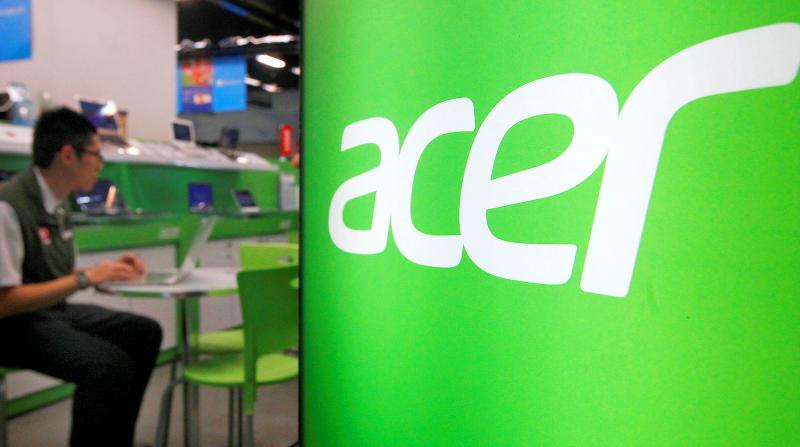PC vendor Acer Inc (宏碁) last quarter ranked first in the global Chromebook market, climbing from No. 4 in the same period of 2020, as it weathered an industry slump better than its rivals, International Data Corp’s (IDC) latest statistics showed.
Acer shipped 1.3 million Chromebooks in the quarter that ended on Dec. 31, falling 43.3 percent annually from 2.2 million units, IDC said.
That gave the company a 26.3 percent market share for the quarter.

Photo: Reuters
Dell Technologies Inc was second with 1 million units, a 63.6 percent decline from 2.7 million in the fourth quarter of 2020.
Lenovo Group Ltd (聯想) seized third place with 800,000 units, dipping 73.5 percent year-on-year from 2.9 million units.
Global Chromebook shipments plummeted 63.6 percent annually to 4.8 million units in the final quarter of last year, from 13.1 million units a year earlier, IDC said.
“Much of the initial demand for Chromebooks has been satiated in primary markets like the US and Europe, and this has led to a slowdown in overall shipments. However, Chromebook demand in emerging markets has seen continued growth in the past year,” Jitesh Ubrani, research manager at IDC’s Mobility and Consumer Device Trackers, said in a statement.
“Supply has also been unusually tight for Chromebooks, as component shortages have led vendors to prioritize Windows machines due to their higher price tags, further suppressing Chromebook shipments on a global scale,” Ubrani said.
For the whole of last year, global Chromebook shipments expanded 13.5 percent to 37 million units, from 32.6 million in 2020, IDC said.
HP Inc defended its top position by shipping 10.2 million units last year, rising 9.3 percent from 2020.
China’s Lenovo Group Inc (聯想) ranked second with shipments of 8.3 million units, growing 23.4 percent from a year earlier.
Acer ranked third with shipments of 6.4 million units, rising 4.6 percent annually.

The US dollar was trading at NT$29.7 at 10am today on the Taipei Foreign Exchange, as the New Taiwan dollar gained NT$1.364 from the previous close last week. The NT dollar continued to rise today, after surging 3.07 percent on Friday. After opening at NT$30.91, the NT dollar gained more than NT$1 in just 15 minutes, briefly passing the NT$30 mark. Before the US Department of the Treasury's semi-annual currency report came out, expectations that the NT dollar would keep rising were already building. The NT dollar on Friday closed at NT$31.064, up by NT$0.953 — a 3.07 percent single-day gain. Today,

‘SHORT TERM’: The local currency would likely remain strong in the near term, driven by anticipated US trade pressure, capital inflows and expectations of a US Fed rate cut The US dollar is expected to fall below NT$30 in the near term, as traders anticipate increased pressure from Washington for Taiwan to allow the New Taiwan dollar to appreciate, Cathay United Bank (國泰世華銀行) chief economist Lin Chi-chao (林啟超) said. Following a sharp drop in the greenback against the NT dollar on Friday, Lin told the Central News Agency that the local currency is likely to remain strong in the short term, driven in part by market psychology surrounding anticipated US policy pressure. On Friday, the US dollar fell NT$0.953, or 3.07 percent, closing at NT$31.064 — its lowest level since Jan.

The New Taiwan dollar and Taiwanese stocks surged on signs that trade tensions between the world’s top two economies might start easing and as US tech earnings boosted the outlook of the nation’s semiconductor exports. The NT dollar strengthened as much as 3.8 percent versus the US dollar to 30.815, the biggest intraday gain since January 2011, closing at NT$31.064. The benchmark TAIEX jumped 2.73 percent to outperform the region’s equity gauges. Outlook for global trade improved after China said it is assessing possible trade talks with the US, providing a boost for the nation’s currency and shares. As the NT dollar

The Financial Supervisory Commission (FSC) yesterday met with some of the nation’s largest insurance companies as a skyrocketing New Taiwan dollar piles pressure on their hundreds of billions of dollars in US bond investments. The commission has asked some life insurance firms, among the biggest Asian holders of US debt, to discuss how the rapidly strengthening NT dollar has impacted their operations, people familiar with the matter said. The meeting took place as the NT dollar jumped as much as 5 percent yesterday, its biggest intraday gain in more than three decades. The local currency surged as exporters rushed to